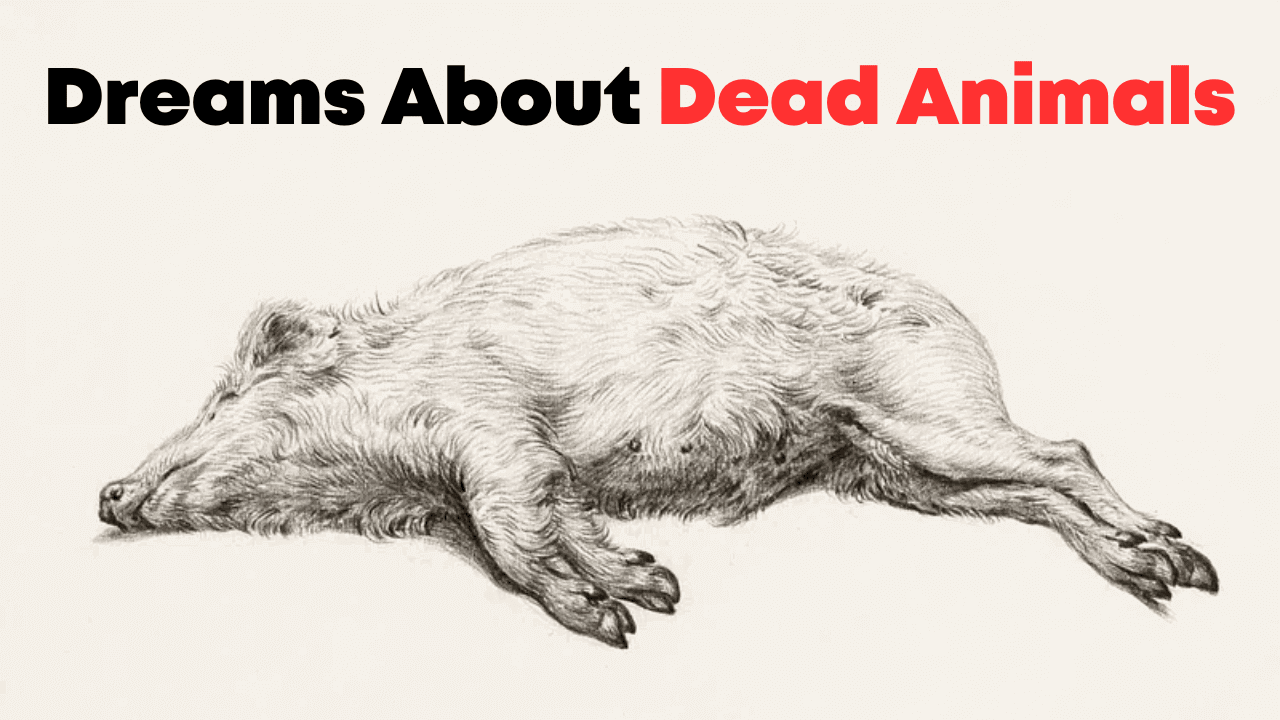Dreams can serve as a mirror to our subconscious, often reflecting our deepest fears, desires, and emotions. Among the myriad dream motifs, those involving dead animals are particularly potent, stirring up a wealth of emotions and questions in the dreamer. This article delves into the realm of dreams about dead animals, exploring their meanings, interpretations, and significance from psychological, cultural, and spiritual perspectives.
Understanding The Meaning of Such Dreams
Dreams about dead animals are rich in symbolism, often connecting with the individual’s life, psyche, and emotional state. These dreams might symbolize an end to something in one’s life, such as a relationship, phase, or personal growth. Animals in dreams are frequently seen as representations of aspects of ourselves or our lives, and their death can signify transformations, loss, or the closure of something significant.
Interpreting Dreams About Dead Animals
The interpretation of dreams involving dead animals hinges on the context, the specific animal, and the dreamer’s personal connection or feelings towards it. Here are a few scenarios and their possible interpretations:
- Dreaming of a Dead Pet: This could signify the dreamer’s processing of grief or loss, a reflection on past relationships, or unresolved guilt.
- Discovering Dead Wild Animals: Might suggest concerns about environmental degradation, a feeling of loss of personal freedom, or a disconnection from one’s instincts.
- Killing an Animal in a Dream: Can indicate the dreamer’s struggle with internal conflicts, aggression, or guilt over past actions.
- Mass Deaths of Animals: Often seen as a warning sign of ignored or unacknowledged emotional turmoil or a reflection on societal issues impacting the collective unconscious.
Why Do People Experience Dreams About Dead Animals?
Dreams about dead animals can stem from a variety of psychological, emotional, and physiological reasons. Psychologically, they might reflect one’s anxieties, fears, or feelings of loss. Emotionally, these dreams could be the mind’s way of processing grief, sadness, or transitions in life. From a physiological standpoint, stress, changes in sleep patterns, or certain medications can trigger vivid and unsettling dreams, including those about dead animals.
Spiritual Interpretation of Dreams About Dead Animals
In many spiritual traditions, dreaming of dead animals is seen as a significant message from the subconscious or the universe. These dreams might symbolize transformation, rebirth, or the need to let go of old habits, beliefs, or emotional baggage to make way for new growth. Spiritually, such dreams encourage introspection and may signal a call to reconnect with one’s inner self or the natural world.
Biblical Interpretation of Dreams About Dead Animals
Biblical interpretations of dreams about dead animals often hinge on the context and the specific animal involved. Generally, these dreams could be viewed as warnings, messages, or revelations. In the Bible, animals are sometimes symbolic of virtues, sins, or prophetic messages. For example, dreaming of a dead dove might symbolize a loss of peace or innocence, while a dead lion could represent a vanquished fear or threat. These interpretations require careful consideration of the dreamer’s personal experiences, beliefs, and the broader biblical context.
Religious Interpretations of Dreams About Dead Animals
Islamic Interpretation
In Islamic tradition, dreams hold significant weight as they are considered a form of revelation. Dreams about dead animals in Islam could symbolize various things depending on the context and the animal. Generally, such dreams might indicate a loss of blessing or warn against the dreamer’s current path. For example, dreaming of a dead sheep could suggest a loss of faith or innocence, urging the dreamer to reflect on their spiritual practices.
Hindu Interpretation
Hinduism sees dreams as messages from the gods or reflections of karmic influences. A dead animal in a dream could represent the culmination of karmic cycles, indicating that the dreamer needs to release past karma or prepare for a new phase in life. Each animal carries specific symbolism; for instance, a dead cow could signify the end of nurturing or abundance periods, prompting introspection and gratitude.
Native American Interpretation
For many Native American cultures, animals are seen as spirit guides and messengers. Dreaming of a dead animal could be interpreted as a sign that one is out of balance with nature or their own spiritual path. It could also mean that a phase of life where that animal spirit was needed as a guide has ended, making room for new guides and growth.
Cultural Interpretations of Dreams About Dead Animals
Japanese Interpretation
In Japanese culture, where Shinto beliefs imbue animals with spiritual significance, dreaming of dead animals can be seen as an important omen. It could indicate a disruption in harmony or a need for purification in aspects of one’s life or surroundings. Rituals or offerings might be considered to restore balance and peace.
Celtic Interpretation
The Celts regarded animals with high esteem, often seeing them as embodiments of gods and ancestors. A dream about a dead animal could signify a disconnection from one’s roots or ancient wisdom. It may also signal a transition, urging the dreamer to reconnect with the natural world and ancestral knowledge for guidance.
African Interpretation
In various African cultures, animals are integral to the community’s survival and are often associated with tribal deities or ancestors. Dreaming of a dead animal might be interpreted as a warning from ancestors or a sign of protection against impending difficulties. It encourages the individual to seek wisdom from community elders and to honor ancestral traditions.
What Psychology Says About Dreams About Dead Animals
Psychologically, dreams about dead animals are rich in symbolism and can be interpreted through various lenses, including Jungian psychology, which emphasizes the collective unconscious and archetypes. These dreams might symbolize aspects of the self that are dying or transforming, such as old habits, attitudes, or phases of life. They can also reflect feelings of vulnerability, loss, or fear of death. Research suggests that such dreams might occur during times of significant personal or emotional transitions, acting as a mechanism for processing and integrating change.
How to Avoid Dreams About Dead Animals
While it’s not always possible to control what we dream, there are strategies to reduce the likelihood of experiencing disturbing dreams, including:
- Maintain a regular sleep schedule: Ensuring consistent sleep can help reduce stress and the likelihood of nightmares.
- Practice good sleep hygiene: Create a relaxing bedtime routine and ensure your sleeping environment is comfortable and conducive to rest.
- Mindfulness and relaxation techniques: Practices like meditation, deep breathing, or progressive muscle relaxation before bed can help manage stress and anxiety.
- Reflect on and process emotions: Journaling or talking about feelings and concerns can help address underlying issues that might manifest in dreams.
- Seek professional help: If disturbing dreams persist, consulting a mental health professional can provide tailored strategies and support.
Conclusion
Dreams about dead animals traverse the boundaries between the spiritual and the psychological, offering insights into our deepest selves and our connections to the world around us. From Islamic to Native American interpretations, each perspective provides a unique lens through which to understand these powerful dream symbols. Psychological insights remind us of the transformative potential of such dreams, reflecting personal growth, emotional processing, and the subconscious mind at work. By embracing these interpretations and employing strategies to foster peaceful sleep, we can navigate the mysterious landscape of our dreams with curiosity and openness. For those continually troubled by such dreams, professional guidance can offer further understanding and support in unraveling the messages embedded in the night’s visions.

